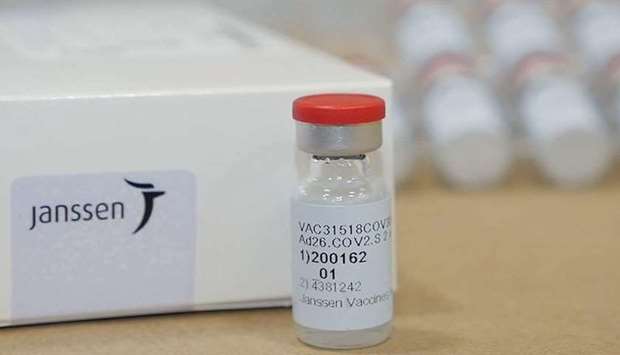US federal health agencies recommended yesterday pausing the use of Johnson & Johnson (J&J)’s coronavirus (Covid-19) vaccine for at least a few days after six women under age 50 developed rare blood clots after receiving the shot, dealing a fresh setback to efforts to tackle the pandemic.
J&J said that it would delay rollout of the vaccine to Europe, a week after regulators there said they were reviewing rare blood clots in four recipients of the shot in the United States.
Acting US Food and Drug Administration (FDA) Commissioner Janet Woodcock said the agency expected the pause to be a matter of days, and was aimed at providing information to healthcare providers on how to diagnose and treat the clots.
The moves come after European regulators said earlier this month they had found a possible link between AstraZeneca’s Covid-19 vaccine and a similar rare blood clotting problem that led to a small number of deaths.
J&J’s single-dose shot and AstraZeneca’s low-cost vaccine are seen as vital weapons in the fight against a pandemic that has claimed more than 3mn lives.
However, in the United States, vaccines from Moderna Inc and Pfizer Inc/BioNTech SE have accounted the vast majority of vaccinations so far.
Immunology experts echoed US officials in underscoring that the risk posed by the J&J vaccine appeared extremely low, and it remained a valuable tool against the risks of Covid-19.
“Even if causally linked to the vaccine: six cases with about 7mn doses ... is not something to panic about,” Dr Amesh Adalja, an infectious disease expert at the Johns Hopkins Centre for Health Security in Baltimore, said in an e-mail, noting that the risk appears lower than the risk of clots from oral contraceptives.
“People are asking me if they should cancel their J&J vaccine appointments and I have told them not to but I know many will and this will stall progress in controlling the pandemic,” he added.
The FDA said there had been one reported death from the rare blood clotting condition among recipients of the J&J vaccine, while another person was in a critical condition.
FDA official Peter Marks said it was “plainly obvious” the J&J cases were “very similar” to the AstraZeneca ones.
However, officials said there had been no similar blood clot cases reported among recipients of the Moderna or Pfizer/BioNTech vaccines, which use a different technology.
The White House said the J&J vaccine pause would not have a “significant” impact on its plan to administer about three million shots per day and a total of 200mn before President Joe Biden’s 100th day in office.
Marks said part of the reason for the pause was to warn doctors that administering the standard treatments for clots can cause tremendous harm, or be fatal.
An advisory committee to the US Centres for Disease Control and Prevention (CDC) will meet today to review the cases, and the FDA will review the analysis, the agencies said in a statement.
All six cases involved women between the ages of 18 and 48, with symptoms occurring six to 13 days after vaccination.
The FDA said symptoms can arise three weeks after the shot and include severe headache, abdominal pain, leg pain or shortness of breath.
In the cases, a type of blood clot called cerebral venous sinus thrombosis (CVST) was seen in combination with low levels of blood platelets, or thrombocytopenia.

FILE PHOTO: A vial of Johnson & Johnson's Janssen coronavirus disease (COVID-19) vaccine. (REUTERS)
